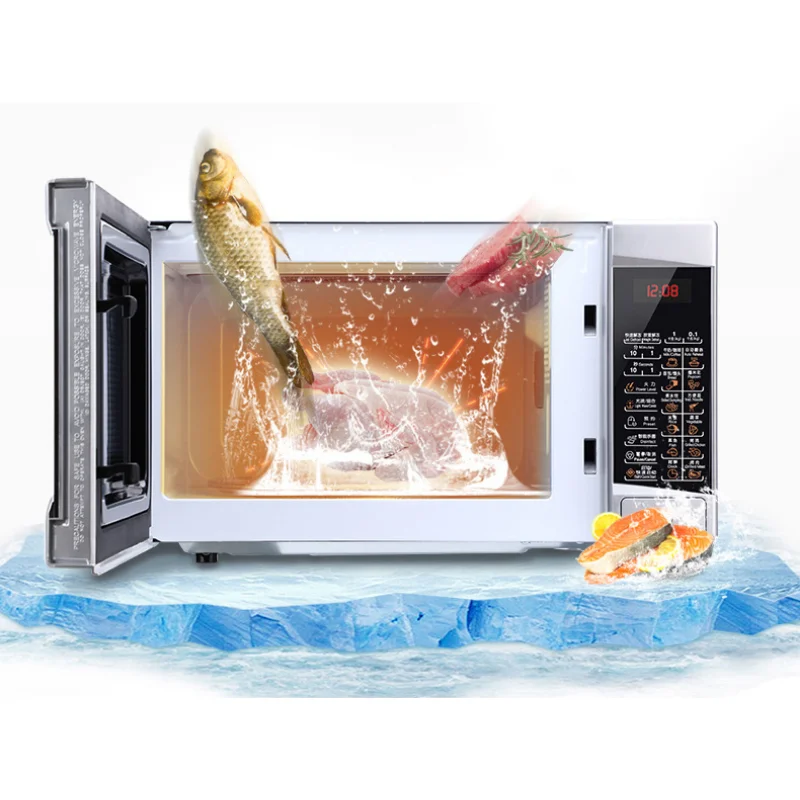Overview of Fish Odor in Microwaves
How to get fish smell out of microwave? Cooking fish in your microwave can cause a strong, unpleasant smell. This odor sticks to the microwave’s interior and lingers long after the meal. If not addressed, the fish smell can persist, affecting the aroma of other foods you heat. Understanding how to get fish smell out of the microwave is crucial.

Fish odors come from oils and particles that vaporize and cling during cooking. The microwave’s confined space and circulated heat intensify the scent. These odors can be stubborn and require specific cleaning methods to remove.
Removing fish smells from a microwave is possible with natural deodorizers or cleaning products. Popular methods involve using vinegar, baking soda, or citrus. For tough smells, commercial cleaners or homemade mixes also work well.
In the following sections, learn about natural and chemical solutions to eradicate fish odor. You’ll also find out how to prevent these smells and manage them without vinegar. Lastly, we’ll discuss severe odors and the importance of replacing microwave filters.
Natural Deodorizing Solutions
When it comes to eradicating fish odors from your microwave, natural solutions are both effective and safe. Not only do they manage the unpleasant smells, but they also do so without the use of harsh chemicals. Here are some of the most effective natural deodorizers you can use:
Using Vinegar Solutions
One of the simplest ways to cut through fish odors is by using vinegar. Mix equal parts water and white vinegar in a microwave-safe bowl. Microwave this solution until it boils for about five minutes. The produced steam will help to dissolve food particles and neutralize odors. After microwaving, wipe the interior with a clean cloth.
Leveraging Baking Soda
Baking soda is known for its deodorizing properties. For a quick fix, sprinkle baking soda on a damp cloth and wipe the inside of your microwave. Alternatively, leave an open box of baking soda in the microwave overnight. This will absorb most of the odor.
Citrus Power: Using Lemons
Lemons can work wonders in eliminating fish smells. Fill a bowl with water, squeeze in the juice of a lemon, and drop the rinds into the bowl. Microwave this for about five minutes, allow it to sit, then wipe down the microwave. The steam and citrus will freshen your appliance.
Coffee Grounds as Deodorizers
Coffee grounds can absorb odors and leave a pleasant smell. Place moist coffee grounds in a bowl and microwave for a few minutes. Allow the microwave to absorb the coffee aroma, then clean it with a soft cloth.
Each of these methods provides a safe and natural way to remove fish odors from your microwave, ensuring it smells clean and fresh without the use of harsh chemicals.
Chemical Cleaning Approaches
When natural methods don’t cut it, chemical cleaning might be necessary for a deep clean. This section will guide you on how to use chemical solutions safely and effectively.
Commercial Microwave Cleaners
For stubborn fish odors, commercial microwave cleaners could be the answer. These are designed to tackle tough smells and grime. Always read the label and follow the instructions. Apply the cleaner to a sponge and wipe the interior surfaces of your microwave.
DIY Alcohol and Oil Mixes
Mix equal parts rubbing alcohol and water in a spray bottle. Add a few drops of essential oil, like lemon or lavender, for scent. Spray inside of the microwave, then wipe it clean with a cloth. Repeat if necessary.
Activated Charcoal Application
Activated charcoal can trap odor molecules effectively. Place a small bowl of charcoal inside and run the microwave for a few minutes. Let it sit, then remove. You might also find charcoal filters made for microwaves.
Remember, always use chemicals carefully. Avoid harsh chemicals that could damage your appliance. By following these tips, you can get your microwave smelling fresh and clean again.
 Preventive Measures for Microwave Odors
Preventive Measures for Microwave Odors
Adopting preventive measures can substantially reduce the occurrence of lingering odors in your microwave. Here are several strategies to ensure your microwave remains fresh:
Regular Cleaning
Regularly clean your microwave to prevent food particles from decaying and emitting odors. Wipe the interior after each use with a damp cloth.
Cover Food When Heating
Always cover food during microwaving. This prevents splattering and traps odors within the food container.
Heat Lemon Water
Periodically, microwave a bowl of water with lemon slices. This helps to neutralize existing odors and freshen the microwave’s interior.
Ventilation After Cooking Fish
If you cook fish, leave the microwave door open afterwards to air it out. This prevents odors from setting into the microwave’s surfaces.
By following these simple yet effective tips, you can keep your microwave smelling clean and prevent the persistence of strong odors like fish.
Freshening Tips Without Using Vinegar
Removing unpleasant fish smells from your microwave doesn’t always require vinegar. Here are other effective alternatives:
Lemon and Water:
Fill a bowl with water and add lemon slices. Microwave the mixture until it boils, usually five minutes. Let it sit, then wipe down the microwave.
Baking Soda Paste:
Create a paste with baking soda and water. Coat the inside of your microwave. Leave for a few minutes, then wipe clean.
Essential Oils:
Mix a few drops of essential oils, like orange or eucalyptus, with water. Spray inside your appliance. Wipe down after a few minutes.
Coffee Grounds:
Put moist coffee grounds in a bowl. Microwave on high for a few minutes. Leave the door closed for the aroma to spread, then clean.
Activated Charcoal:
Place activated charcoal inside your microwave. Heat for a few minutes, then leave it in to absorb odors.
Using these methods will keep your microwave smelling fresh and free of fish odors without the need for vinegar.
Addressing Persistent or Unusual Microwave Odors
Persistent or unusual odors in your microwave can be frustrating. Here’s how to tackle them effectively.
What to Do About Severe or Unusual Smells
If the fish smell persists or you notice an unusual odor, it might be more than just food residue. Unusual smells can sometimes indicate a mechanical issue. In such cases, a thorough clean might not suffice.
- Inspect for Faulty Components: Check if there’s any visible damage or burnt parts inside your microwave. Damaged components often contribute to bad smells.
- Deep cleaning: Perform a deep clean using a stronger solution, like a mix of baking soda and lemon juice. Apply the paste to the interior, heat it for a few minutes, then wipe it off thoroughly.
- Service and Repair: If cleaning does not remove the odor, consult a professional technician to inspect your microwave for any malfunctions.
- Odor Absorbing Gels: Consider using odor-absorbing gels that can neutralize persistent smells effectively.
By being proactive in identifying and addressing these unusual odors, you can restore your microwave’s freshness and functionality.
 Replacing Microwave Filters for Odor Management
Replacing Microwave Filters for Odor Management
Regular replacement of your microwave’s filters can be key in controlling odors. Over time, filters can clog with grease and food residue, trapping smells. For effective odor management, follow these simple steps:
Yearly Filter Replacement
Change your microwave’s filter at least once a year. Check your manual for the specific type. You can usually buy replacements online or at appliance stores. Simply remove the old filter and snap in the new one.
Regular Filter Checks
Inspect your filter every few months. If it looks dirty, clean or replace it sooner than planned. A clean filter means a fresher-smelling microwave.
Choosing the Right Filter
Ensure you select the correct filter for your microwave model. Incorrect filters won’t trap odors well. Use the model number to find the perfect fit.
Importance of Clean Filters
Clean filters help your microwave work efficiently. They prevent odors from spreading to other areas in your kitchen. Without grease buildup, your microwave also becomes safer to use.
By maintaining your microwave’s filters, you prevent long-term odor problems. Regular checks and replacements keep it running smoothly and smelling fresh.
Conclusion
In conclusion, getting rid of the fish smell in your microwave doesn’t have to be a daunting task. With a variety of effective methods at your disposal, ranging from natural solutions like lemon and vinegar to commercial odor neutralizers, you can reclaim the freshness of your kitchen.
By employing immediate cleanup strategies, utilizing DIY solutions, considering advanced options for persistent odors, and taking preventive measures, you can ensure that the smell of fish does not become a permanent fixture in your microwave.
So next time you cook fish, follow these tips on how to get fish smell out of microwave to maintain a pleasant cooking environment!
